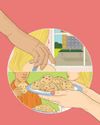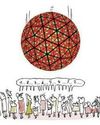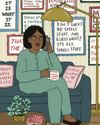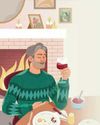
On a beautiful, ordinary summer day in 2009, I watched my partner drown. Matt was strong and healthy—just three months from his 40th birthday. We had joked that he was half mountain goat, able to scale waterfalls if need be. There was no reason he should have drowned. It was random, unexpected, and it tore my world apart.
We had gone out to the river on the first sunny day after several weeks of rain. Matt went swimming while I stayed in the woods with our dog. When he called out for help, I saw him swept away by a flood-swollen current. The dog and I ran in, trying to save him, but were carried two miles downriver. Search teams found Matt’s body three hours later.
I thought I knew quite a bit about grief. After all, I’d been a psychotherapist for nearly a decade. I had worked with hundreds of people, from those wrestling with substance addiction and patterns of homelessness to private-practice clients facing decades-old abuse, trauma, and grief.
After Matt died, I wanted to call every one of my clients and apologize for my ignorance. With all of my experience and training, if anyone could be prepared to deal with that kind of loss, it should have been me. But none of what I’d learned mattered.
And I wasn’t alone. In the first years after Matt’s death, I slowly discovered a community of grieving people. It wasn’t just loss that we had in common. We shared stories of being encouraged to “get over it,” put the past behind us, and stop talking about those we had lost. We were admonished to move on and told we needed these deaths in order to learn what was important in life.
Even those who tried to help ended up hurting. Platitudes and advice, even when said with good intentions, came across as dismissive, reducing great pain to empty one-liners. At a time when we most needed love and support, each one of us felt alone, misunderstood, judged, and dismissed.
Diese Geschichte stammt aus der December 2019 - January 2020-Ausgabe von Reader's Digest US.
Starten Sie Ihre 7-tägige kostenlose Testversion von Magzter GOLD, um auf Tausende kuratierte Premium-Storys sowie über 8.000 Zeitschriften und Zeitungen zuzugreifen.
Bereits Abonnent ? Anmelden
Diese Geschichte stammt aus der December 2019 - January 2020-Ausgabe von Reader's Digest US.
Starten Sie Ihre 7-tägige kostenlose Testversion von Magzter GOLD, um auf Tausende kuratierte Premium-Storys sowie über 8.000 Zeitschriften und Zeitungen zuzugreifen.
Bereits Abonnent? Anmelden

Cookies for Forgiveness
My blowup was half-baked. The apology wasn't

Puff the Magic Pastry
It always rises to the occasion

New Year's Traditions Around the World
1 MOST OF US spend the final seconds of each calendar year watching a nearly 12,000-pound geodesic sphere descend over Times Square in New York City.

Mom's Wall-Sign Wisdom
She never met a plaque or bumper sticker she didn't quote

Protect Your 'Holiday Heart'
This joyful time of year can also be dangerously stressful

Heroes of the Holidays
It's not just Santa Claus bringing the holiday magic this season. As you'll see, he's got elves all over.

The Man Who Looks After His Wife's Ex
For him and his bride, \"in sickness and in health\" meant something really special

How Risky Are Those Holiday Cocktails, Really?
The latest recommendations about drinking and your health

HOW ONE KENTUCKY TOWN SAVED ITSELF
Downtown Hazard had lost its small-town mojo to drugs. Former addicts are helping to bring it back.

Dream It, Do It, Done!
Your bucket-list goals, accomplished